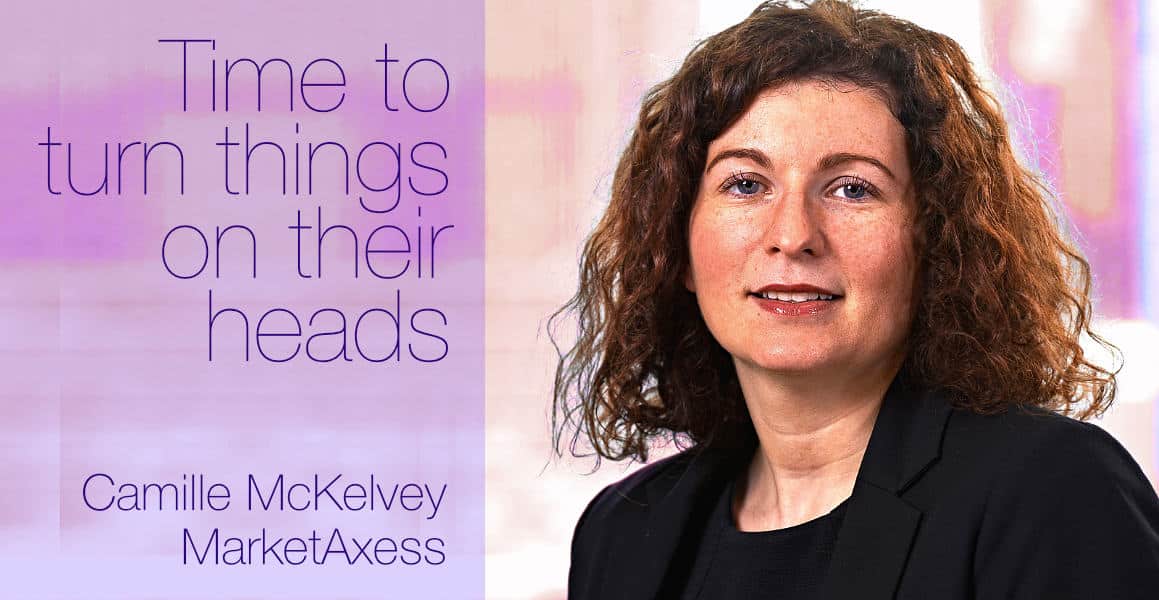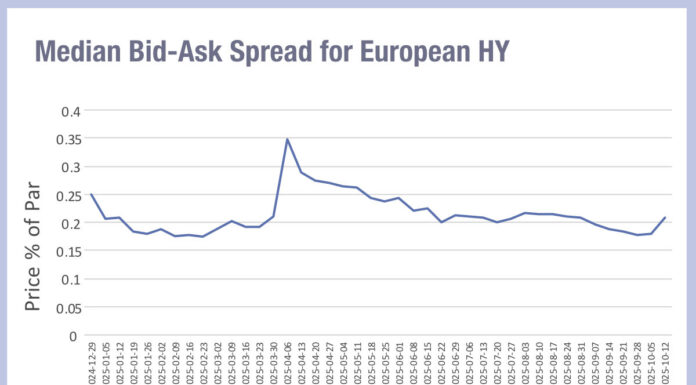
Shanny Basar spoke to Camille McKelvey, Head of Post Trade STP Business Development at MarketAxess, about languages, diversity in the workplace and career paths.
She said: “I did Russian and French from a young age and it was just the thing that I was really passionate about. I still am, and went on to do Spanish as well. Languages are my thing.”
Working in a global industry such as financial services offered an opportunity to use that skill-set. McKelvey leads the straight-through processing team at MarketAxess which focuses on achieving post-trade efficiency across the fixed income cash and repo markets.
“Over the longer term we aspire to have a true global offering for the post-trade business alongside our other business lines,” she added.
Trading and settlement faced challenges when the industry had to suddenly shift to working from home last year due to the Covid-19 pandemic. MarketAxess, which operates an electronic fixed-income trading platform and provides market data and post-trade services, had to set up 10,000 users remotely in a very short time.
“We were able to mobilise extremely quickly so clients could continue to trade without any disruption and it was amazing,” said McKelvey. “It has not been easy but it’s great to see what we have achieved in this challenging period.”
MarketAxess reported record quarterly credit trading volume and record revenue in the first quarter of this year. Average daily volume in the post-trade repo platform has also risen significantly year-over-year. Rick McVey, Chairman and CEO of MarketAxess, said in the results statement that market share gains drove the volume and revenue growth as electronic trading continued to advance in fixed-income markets around the globe and automation continues to accelerate.
During the pandemic McVey and Chris Concannon, COO and President, held a series of coffee mornings with a random selection of employees across the organisation.
“We have a very flat structure and it’s great to have exposure to such senior levels of management,” added McKelvey. “Over the last year management have really demonstrated they care about employee wellbeing and there has been no pressure to go back to the office until it’s safe and comfortable. We have put more focus on mental health and wellbeing.”
Automation
McKelvey continued that repo is an asset class that is somewhat behind in the level of automation for a multitude of reasons, but the pandemic has been a catalyst for change. Levels of engagement and the appetite to review processes and increase efficiency across securities finance have risen.
“In addition, CSDR is also around the corner which imposes fines for settlement failures,” she added. “Regulation is also a driver in nudging people in the right direction.”
The European Union’s Central Securities Depositories Regulation (CSDR) aims to harmonise timing and standards of conduct in securities settlement. The EU regulation will affect any firm around the world that trades in securities that ultimately settle in an EU-domiciled central securities depository. CSDR imposes daily penalties or charges for trades that fail, as well as mandatory buy-ins, have met resistance from market participants.
Every organisation has a programme around CSDR and is focusing on implementation, but McKelvey said there is still a lot of uncertainty around the regulation which makes it difficult for firms to plan. In addition, if there are no definitive answers until the third quarter, big organisations go into a year-end code freeze and implementation will become more challenging.
In addition to CSDR, MarketAxess is focussed on migrating clients from its acquisition of Regulatory Reporting Hub, the regulatory reporting business of Deutsche Börse Group, which completed at the end of last year.
“We have lots of people working on that and it is going really well,” said McKelvey. “The acquisition opens up a broader geographical client base and gives us a good opportunity to grow our global footprint.”
She added that MarketAxess’ repo business was historically largely in the UK and Europe but the firm has established a presence in the US which has taken off this year. In November 2019 Citadel and J.P. Morgan extended their use of MarketAxess’ automated repo trade confirmation platform outside Europe for the first time – into the United States. McKelvey said there are some key broker-dealers in the US who are early adopters of the automated confirmation platform.
“It takes time to build a community but it does feel like we have reached an inflection point,” she added. “It makes me even more proud that we have been able to sell the benefits of the platform in the past 18 months.”
Asia is also a large component of the repo market, but is still voice-traded and extremely manual in the region, so MarketAxess sees a huge opportunity to replicate the progress the firm has made in other regions.
Career
McKelvey started working in the back office in settlements after finishing her Russian and French degree at University College, London, and said the understanding of how everything works together from the ground up has served her really well.
“Anyone who worked in the back office seemed to have the goal to get onto the desk as a trader or a salesperson,” she added. “However when I was at Morgan Stanley I was asked to be the manager of the repo trade support team and that led me down a slightly different path.”
An ex-colleague asked her to join Citi to help automate the repo function, which is where she met the MarketAxess team, as they provided Citi’s bond matching platform. MarketAxess offered her the role of product manager for the matching platform, which was a big change at the time.
“I took the plunge, which turned out to be a great trade and I have not looked back since,” said McKelvey. “Over the past seven years, the organisation has grown so dramatically and it has been great to be part of the integration of the MarketAxess Post-Trade business, and the MarketAxess global headcount has grown to more than 600.”
In 2013 MarketAxess completed its acquisition of Xtrakter, the operator of trade matching and reporting system TRAX.
Diversity
McKelvey said MarketAxess has been extremely supportive of the work she does on the steering committee of the ICMA Women’s Network.
“I’m really proud of having more than 2,000 members, since at the start it was a few of us sitting in a room in the ICMA offices,” she added. “We now have regional hubs and events in Spain, France and Switzerland and we’re looking at Asia.”
She explained that at ICMA (The International Capital Market Association), the network recognised the need to encourage more men into the conversation as otherwise this leads to the creation of more silos.
“Men need to support women so we made a push to make the content of events helpful to anybody trying to grow their career, rather than being gender specific,” McKelvey said. “Events have been harder in the virtual environment but the last we did was on mental health awareness and I was actually blown away because people were so honest about their experiences. “
MarketAxess also has its own diversity programmes and the latest intern programme is 50% female. The firm is also looking at how to encourage more diverse candidates of all types, not just women. One outcome of Covid-19 is that it has created more flexibility and opened up the talent pool to people outside London.
McKelvey said: “Fintech and financial services are still predominantly male but MarketAxess is putting in the right steps to change that and we signed up to the UN Women’s Empowerment Principles last year.”
She wants anyone to believe that they can come into the financial services industry. McKelvey was recently a keynote speaker at a WeAreTechWomen conference on her journey into fintech and explained that she is not a coder. Women do not apply for jobs if they feel they don’t meet 100% of the criteria and McKelvey stressed that this imposter syndrome needs to be turned on its head.
“I understand the jargon, how things fit together but I’m not an engineer so it doesn’t mean that you can’t be successful in fintech,” added McKelvey. “Women need to look at the things they can bring and can already do, and what they might learn along the way.”
McKelvey put her success down to not being afraid to speak up and having the ability to build relationships with people, which is very important.
“I’ve had to get used to often being the only female voice in the room and I don’t even see it anymore,” she added, “However, I was at an internal work meeting the other day that wasn’t about diversity and there were four or five women, so things are changing.”
©Markets Media Europe 2025












